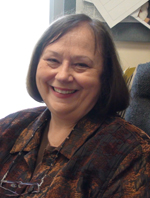|
|

|
Women's history month
Biometrist has championed AHEC programs
|
This
is the eighth in a series of articles honoring MUSC women who have
changed the face, landscape and direction of MUSC and the medical
center. This year's theme is Women Taking the Lead.
by Mary Helen Yarborough
Public Relations
For more than 30 years, Beth Kennedy has worked quietly connecting
people, departments and external resources to solve societal
challenges. Her reach touched health care and the disadvantaged,
disaster preparedness for hospitals, the allied health professions and
novel approaches to data collection and use.
 Beth Kennedy Beth Kennedy
The associate program director for the S.C. Area Health Education
Consortium (AHEC), describes her career as one of service through
teamwork and teambuilding, while her colleagues have defined her as a
true leader.
As author or co-author of grants that brought MUSC and AHEC more than
$15 million, Kennedy's guidance has helped foster community-based
education, workforce development, community disaster preparedness
and health care for underserved populations.
An example of her seed-to-garden performance was a federal and state
bioterrorism grant in 2003. Her submission garnered the fledgling
disaster response effort a first-place ranking among all other grant
proposals in the country. Through that $6 million from the Office of
the Assistant Secretary for Preparedness and Response in the U.S.
Department of Health and Human Services, she directed a five-year
disaster preparedness project that trained more than 30,000 health
professionals, first responders, health profession students, and
volunteers in disaster response awareness and performance. The project
resulted in development of the first dental forensic team in South
Carolina enabling identification of disaster victims from dental
records, she explained.
The S.C. Department of Health and Environmental Control (DHEC) also
funded the project to train the state’s medical reserve corps for
service in major emergencies.
The grant, which expired this year, was used to train hospitals in
decontamination. Two mobile units were developed through the project: a
special mobile decontamination van, equipped with tents, special gear
and decontamination equipment; and a second that was used for the
Simple Triage and Rapid Treatment (START) program. The vans were so
effective in statewide drill-tests that the states of North Carolina,
Florida and Ohio asked to use and replicate them.
A paper on the disaster response project on the S.C. AHEC Disaster
Preparedness and Response Training Network was published in the March
issue of the Journal of Public Health Management and Practice, and is
co-authored by Kennedy, Deborah Carson, Ph.D., and David Garr, M.D.,
AHEC executive director.
In responding to how she was recommended as being among MUSC sterling
examples of women leaders, Kennedy said, “I have asked myself this
question, since I am not a great researcher, scientist or health care
provider; just an administrator of a health professions education
program,” said the College of Charleston psychology major who later
earned a master’s in biometry at MUSC.
Her diverse set of grant developments has covered awards in migrant
health, Health Education Training Centers, model AHEC programs, nurse
refresher courses, rural interdisciplinary and allied health
interdisciplinary education, physician assistant training and disaster
preparedness training. In the mid-1990s, AHEC won a competition for a
national contract for educational redesign based upon an application
she wrote, and she directed the activities that included faculty from
MUSC, the University of South Carolina and Clemson, and administers
from other state agencies.
Kennedy began her career just after graduate school and was responsible
for designing databases, reporting and evaluation. “I soon discovered
my true passion was for health professions education,” Kennedy said.
In her role, Kennedy helped design the first rural interdisciplinary
education experience in South Carolina and designed a program to take
public health students to migrant camps to provide health promotion and
disease prevention training. Her efforts have also entailed bringing
nurse executives and direct care nurses together each year to learn
about improving their working environment and striving for excellence.
“It really has been about recognizing talents of others and teamwork
within AHEC, the College of Health Professions and the university,” she
said. “Nothing I have done is in isolation.”
She credits her former director, Sabra Slaughter, Ph.D., for providing
the intellectual space, training and support to spread her professional
wings, and she quickly praises her female colleagues.
“As a mother of two daughters and having two granddaughters, I want women to be recognized for
all the outstanding work they do. Young women need strong,
successful role models and we must make them visible,” Kennedy said.
“We must celebrate women’s victories, promote their successes, and seek
to incorporate them into every level of our university, our state
organizations and national initiatives.”
Kennedy cites the AHEC statewide system as having a significant cohort
of women leaders today, a change from 30 years ago when she began
working with AHEC as the only female administrator in the system.
“Health care and health professions education in South Carolina have
made significant advances in elevating women, but we still have fewer
CEO’s, deans, and executives than men even though we represent the
largest working group in health care,” she noted.
“My love of education comes from my mother, the best first grade
teacher ever; and my father who always made learning fun,” Kennedy
recalled. “My love for health care comes from my grandfather, a country
physician.”
Kennedy will retire in May, butsaid she still has a lot to offer and teach others.
Collaboration has been critical to her success.
“I have always felt that in order to lead one must first serve. This
philosophy has served me well and this is what I have tried to teach
the junior level personnel with whom I interact,” Kennedy said.
Friday, March 27, 2009
|
|
|



